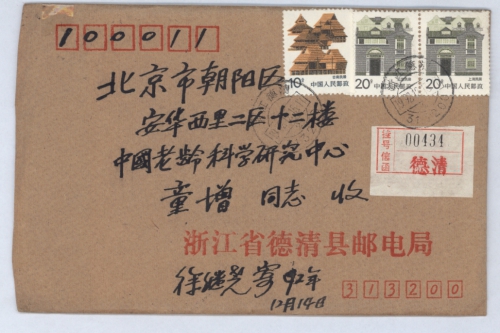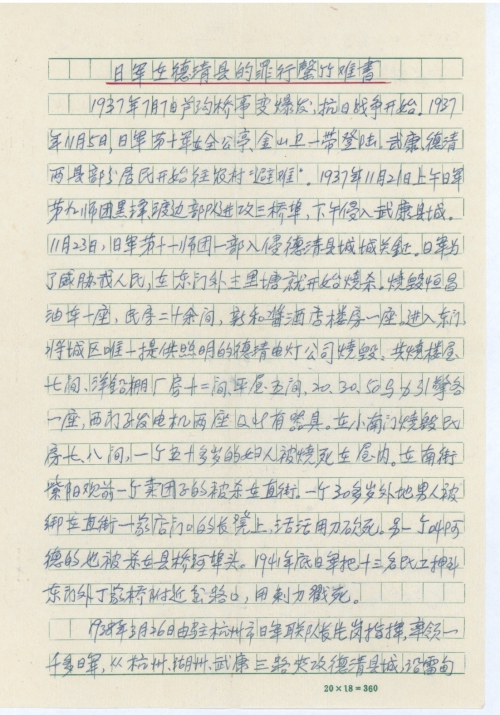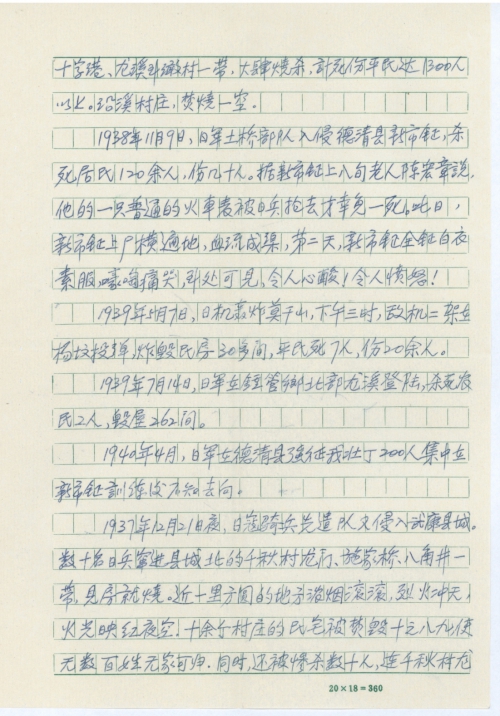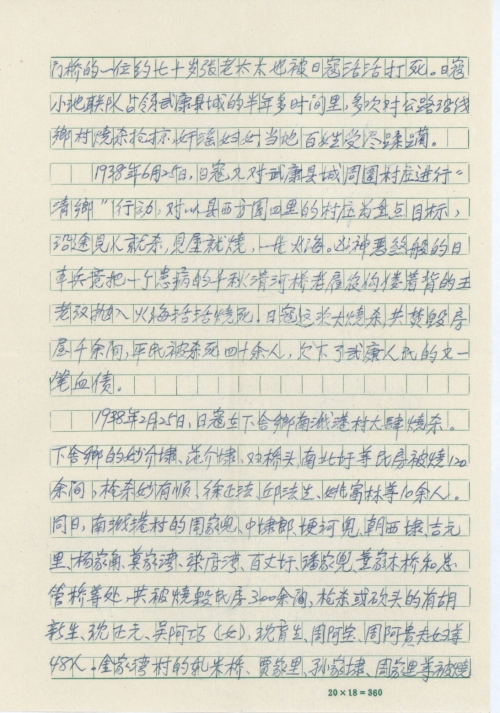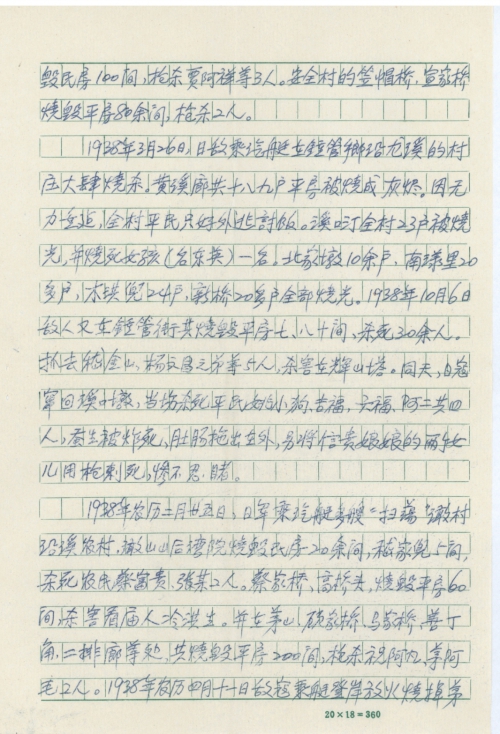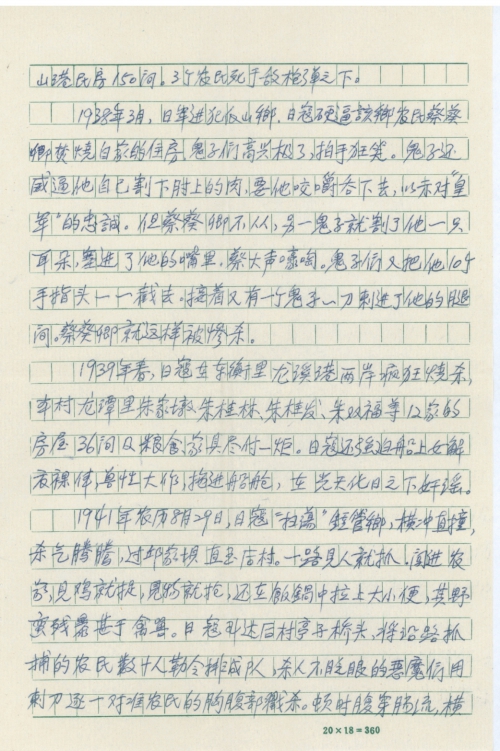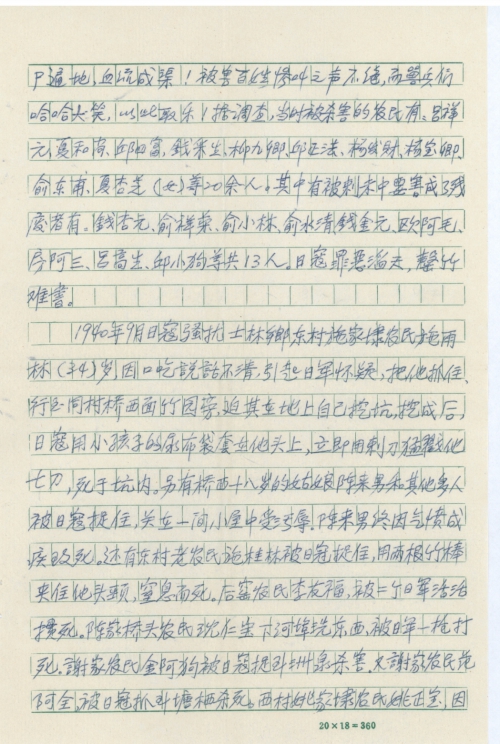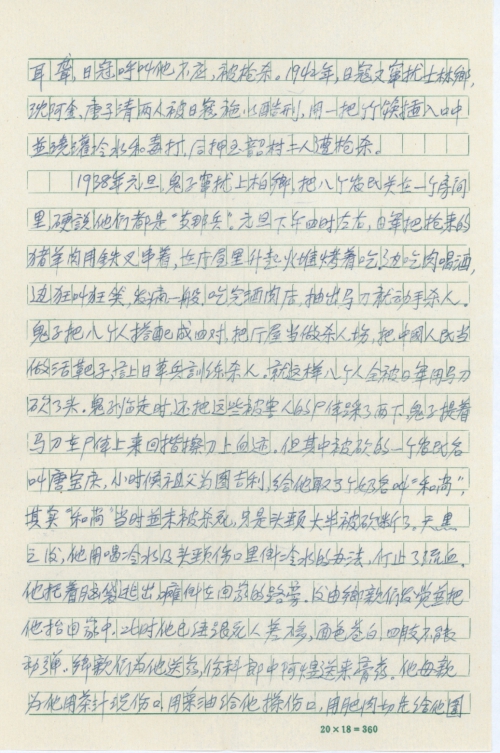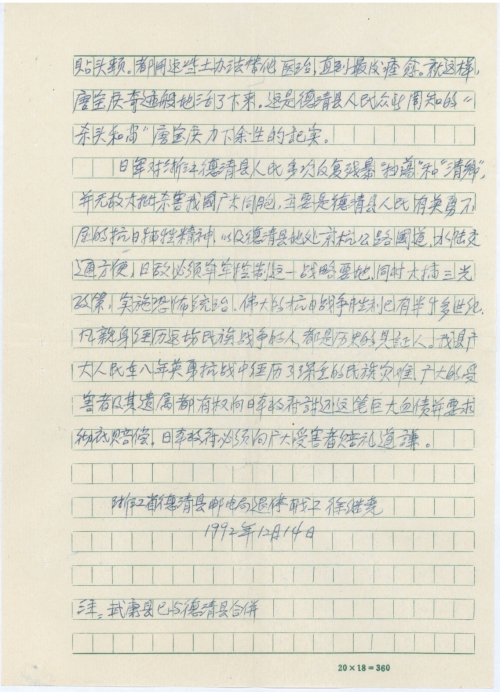Date of letter:1992-12-14
Address of author:Deqing County, Huzhou City, Zhejiang Province
Date of event:1937-1941
Location of event:Deqing County, Huzhou City, Zhejiang Province
Name of author:Xu Jiyao
Name(s) of victim(s):Many peopleType of atrocity:Murders, Rapes, Air Bombings, Others, Other Massacres(MU, RA, AB, OT, OM)
Other details:In 1937, the Japanese invaded Deqing County and committed all sorts of crimes. They tortured civilians here by extremely cruel means. I have listed the experience of some victims and some crimes committed by the Japanese soldiers. All the victims and their family members have the rights to seek justice from Japan. Japan must repay the huge debts of blood.
Countless Crimes Committed by the Japanese Army in Deqing
The Lugou Bridge Incident took place on July 7, 1937, marking the beginning of the Sino-Japanese War. On November 5, 1937, the Japanese No. 10 Army landed at Quangongting and Jinshanwei. Some residents of Wukang and Deqing began to flee to the countryside for shelter. On the morning of November 21, 1937, the KUROSAWA and WATANABE troops of the Japanese No. 9 Army attacked Sanqiaobu and invaded Wukang County in the afternoon. On November 23, the first troops of the Japanese No. 11 Army invaded Chengguan, Deqing. The Japanese army began to burn and kill at Sanlitang to the east of the town as a threat to the Chinese people. The Japanese army burned a Hengchang tanker, over 20 residential houses and a building of Xinhejiang Hotel. After entering East Gate, they burned down Deqing Lighting Company, the company that provided lighting for the urban area, as well as 7 buildings, 12 sheds, 5 bungalows, 3 engines with 20, 30 and 50 horsepower respectively, two Siemens generators and all tools. They burned 7 or 8 residential houses at South Gate, causing an over 50-year-old woman to be burned to death in her house. A man selling buns in front of Ziyangguan Monastery in South Street was killed in Zhi Street. An over 30-year-old man, not a local, was tied on a bench in front of a store in Zhi Street and stabbed to death. Another man named A De was killed at the dock. At the end of 1941, the Japanese army escorted 13 forced laborers to an intersection near Dingjiaoqiao outside East Gate and bayoneted them.
On March 26, 1938, XX KATAOKA, the officer of the Japanese United Army stationed in Hangzhou commanded over 1,000 Japanese soldiers to attack Deqing County from Hangzhou, Huzhou and Wukang. They burned and killed along the way from Shizigang, Leidian to Longxi and to Gan Village. The estimated civilian casualties were over 1,300. Thus, the Japanese army annihilated the whole Yanxi Village.
On November 9, 1938, the Japanese TUCHIHASHI Troops invaded Xingshi, Deqing, killing over 120 people and injuring dozens. According to an 80-year-old Chen Hongzhang at Xinshi, he survived by offering his watch, a rather common one, to Japanese soldier. The next day, Xinshi was covered with corpses and bloody streams were everywhere to be found, and the surviving residents wore white to mourn for the dead. Their sadness was heard and seen everywhere. The scene was so outrageous!
On May 7, 1939, Japanese planes bombed Mogan Mountain and at 3 p.m., two planes dropped bombs at Yangwen, destroying over 30 residential houses, killing 7 people and injuring over 20.
On July 14, 1939, the Japanese army landed at Longxi in the north of Zhongguan, killing 2 farmers and destroying 262 houses.
In April 1940, the Japanese army forcibly took away 200 strong men from Deqing and trained them at Xinshi. Their whereabouts were unknown after that.
At the night of December 21, 1937, the Japanese cavalry troops invaded Wukang again. Dozens of Japanese soldiers burned houses at Longmen, Qianqiu Village as well as Shijiaoqiao and Bajiaojing in the north of Wukang. The thick smoke and flames lit up the sky. 80% or 90% of the houses in over 10 villages were burned down, causing numerous people homeless. Meanwhile, dozens of people were killed, including an about 70-year-old woman living at Longmenqiao, Qianqiu. The Japanese KOIKE United Troops occupied Wukang for over half a year, when they liberally, and at will, burned, killed, robbed and raped at the villages along the highways. The local people had tremendous suffering under their raids
On June 25, 1938, the Japanese army raided surrounding villages of Wukang, killing people and burning houses. A vicious Japanese soldier even threw an old sick hunchback man living at Qingheqiao, Qianqiu into the fire, to be burnt alive. In this raid, over 1,000 houses were burned down and over 40 civilians were killed. The Japanese army owed another bloody debt to the Wukang people.
On February 25, 1938, the Japanese army burned and killed at Nanqiangang, Xiashe. Over 120 houses at Miaojiedai, Fanjiedai, Shuangqiaotou and Nanbeiwei of Xiashe were burned down and over 10 people including Miao Youshun, Xu Zhengfa, Qiu Fasheng and Yao Fulin were gunned down. On the same day, over 300 houses at Zhoujiaer, Zhongdailang, Genghe’er, Chaoxidai, Jiyuanli, Yangjiajiao, Mojiawan, Randianwan, Baizhangwei, Panjiaer, Dongjiamuqiao and Zongguanqiao of Nanqiangang Village were burned down and 48 people including Hu Xinsheng, Shen Zhengyuan, Wu Aqiao (female), Shen Yusheng, Zhou Abao, Zhou Agui and his wife were executed or beheaded. Over 100 houses at Yamiqiao, Jiajiali, Sunjiadai and Zhou Jiali of Jinjiawan Village were burned and 3 people including Jia Axiang were shot dead. Over 80 houses at Limaoqiao and Xuanjiaqiao of Anquan Village were burned and 2 people were shot.
On March 26, 1938, the Japanese soldiers took gas boats to reach villages along Longxi at Zhongguan Village, killing and burning there. 18 or 19 bungalows of Huangxilang were burnt to ashes. Unable to rebuild houses, all villagers had to leave their homes and begging for a living. All 23 houses of Xikouding Village were burned down and a girl (called Dongying) was burned to death. Over 10 houses of Beijiadun, over 20 houses of Nanyangli, 24 houses of Muhong’er and over 20 houses of Xinqiao were all burned down. On October 6, 1938, the enemy burned 70 or 80 bungalows in Zhongguan Street and killed over 30 people. 5 people including Ji Jinshan and Yang Wenchang were taken away and killed at Huishanta. On the same day, the Japanese soldiers returned to Xikoudun and killed 4 civilians including Yao Xiaogou, Ji Fu, Liu Fu and A Er on the spot. Can Sheng was bombed to death with guts flowing out of his body. Two daughters of Mrs. Xingui were killed with guns. What a horrible sight.
On lunar February 25, 1938, the Japanese army took gas boats to raid Gan Village. Over 20 residential houses at Wanyuan behind Gan Mountain and 5 houses of Ji Jiaer’s family were burned and 2 farmers Cai Fugui and Zhang XX were killed. 60 bungalows at Caijiaqiao and Gaoqiaotou were burned and Leng Hongsheng, the keeper of the temple, was killed. Moreover, 200 bungalows at Maoshan, Gujiaqiao, Majiaqiao, Shandingjiao and Erpailang were burned and 2 people named Zhu Awan and Mao A’mao were shot. On lunar April 11, 1938, the Japanese soldiers took a boat to land at Maoshangang, where they burned 150 houses and killed 3 farmers.
In March 1938, Japanese soldiers invaded Fanshan Village, where they forced farmer Cai Kuiqing to burn his own house and the Japanese soldiers were entertained with joyful applause. The soldiers continued their cruelty by threatening to cut flesh from his arm and eat it to show loyalty to the Imperial Army. But Cai refused, so another soldier cut off his ear and squeezed it into his mouth. Cai cried out loud. The soldiers then cut off his fingers one by one and stabbed him in the leg. Cai was cruelly killed in this way.
In the spring of 1939, the Japanese soldiers madly burned and killed along the banks of Longxigang, Donghengli. 36 houses with 12 people including Zhu Jiadun, Zhu Guilin, Zhu Guifa and Zhu Shuangfu were burned, including the food and furniture in these houses. They also forced women to take off their clothes and raped them in the boat.
On lunar August 29, 1941, Japanese soldiers raided Zhongguanxiang, arresting people, robbing chicken and property and even shitting in the rice cooker like barbaric beasts. They took dozens of farmers to Tingziqiao at the back of the village, made them stand in a line and then bayoneted them. The ground was instantly covered with corpses and blood. The victims screamed out of pain, while the soldiers laughed happily. A survey showed that over 20 farmers were killed, including Lv Xiangyuan, Xia Heshang, Qiu Sifu, Qian Caisheng, Liu Jiuqing, Qiu Zhengfa, Yang Facai, Yang Baoqing, Yu Dongfu and Xia Xingzhi (female). 13 people were disabled by stabbing, including Qian Xingyuan, Yu Xiangrong, Yu Xiaolin, Yu Shuiqing, Qian Jinyuan, Ou Amao, Fang Asan, Lv Gaosheng and Qiu Xiaogou. The horrible crimes committed by the Japanese army are countless.
In September 1940, a farmer named Shi Yulin (34) from Shijiadai in the east of Shilinxiang was suspected due to his stuttering and captured by the Japanese soldiers. They took him to Zhuyuan in the west of Tongcunqiao and forced him to dig a hole on the ground. Then, they put a diaper on his head, stabbed him 7 times and threw him in the hole. Moreover, Japanese soldiers captured an 18-year-old girl Chen XX from Qiaoxi and other people, locked them in a room and raped them. Chen XX got sick due to anger and died. An old farmer named Shi Guilin from Dong Village was captured by Japanese soldiers. They squeezed his head with two sticks and suffocated him to death. Another farmer Li Youfu from Houjiao was hurled to death by two soldiers. Farmer Jin Agou was taken way to Zhouquan and killed. Farmer Fan Aquan was captured and killed in Tangxi. A deaf farmer Yao Zhengbao from Xi Village was shot to death because he didn’t answer Japanese soldiers. In 1942, Japanese soldiers raided Shilin Village, where they brutally punished Shen Ajin and Tang Ziqing by inserting chopsticks into their mouths, pouring cold water at them and beating them, then took them to Shao Village and shot them.
On the New Year’s Day of 1938, the Japanese soldiers raided Shangboxiang, where they captured and locked 8 farmers in a room because they believed they were Chinese soldiers. At about 4 p.m., the Japanese soldiers roasted pigs and goats in the house, drinking and laughing. After the meal, they used the 8 farmers as targets and killed them as an exercise. 8 farmers were killed like that. The soldiers stepped on their corpses and wiped the blood off the bayonet on their clothes before leaving. But one of the farmers Tang Baoqing, whose grandfather gave him an infant name “Heshang” for good luck, was not dead then although his neck was almost cut off. After dark, he drank cold water and poured it to the neck to stop bleeding. He escaped and collapsed on the way back. Other villagers found him and took him home. With a pale face and unable to move, he was just like a dead man. Other villagers provided medicine for him. The doctor A Yu brought him plaster. His mother cleaned his wound with tea, put some vegetable oil on it and wrapped his neck with sliced fat meat. At last, these indigenous methods cured him. Tang Baoqing miraculously survived. His story is well known by the Deqing people.
The Japanese army repeatedly employ their extreme cruel campaigns of “total raidings” and “thorough sweeping” of Deqing and butchered many local people, trying to crush their spirit and took control of the strategic location of Deqing. But the local people bravely fought against their cruelty and resisted the invasion. As Deqing was conveniently located at the Beijing-Hangzhou Highway, the Japanese army must firmly control the strategic location. They implemented a reign of terror by carrying out the “Three Alls” Policy. We have won the anti-Japanese war for half a century. Anyone who has gone through the war is a witness of history. Our Deqing people suffered much for fighting bravely for 8 years. The victims and their offspring have the right to demand compensation against the Japanese government and the Japanese government must apologize to the victims.
Retired employee from the Postal Office of Deqing, Zhejiang
Xu Jiyao
December 14, 1992
Note: Kangwu has been combined with Deqing














